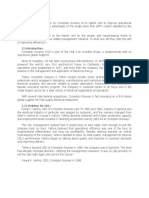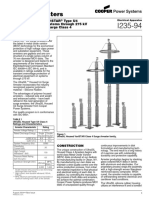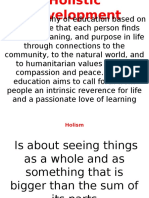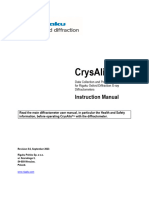Philo Final
Philo Final
Uploaded by
APRIL LYN D. GETI-AYONCopyright:
Available Formats
Philo Final
Philo Final
Uploaded by
APRIL LYN D. GETI-AYONCopyright
Available Formats
Share this document
Did you find this document useful?
Is this content inappropriate?
Copyright:
Available Formats
Philo Final
Philo Final
Uploaded by
APRIL LYN D. GETI-AYONCopyright:
Available Formats
Republic of the Philippines
Region VI- Western Visayas
Department of Education
Division of Capiz
COL. PATROCINIO ARTUZ NATIONAL HIGH SCHOOL
Taft, Tapaz, Capiz
INTRODUCTION TO THE HUMAN PHILOSOPHY
Mid- Term Examination
S.Y. 2018-2019
MULTIPLE CHOICES
Directions: Read the statement carefully and choose the letter of the correct answer.
1. It is the study or discipline that uses human reason to investigate the ultimate causes, reasons, and principles
which govern all things.
a. Epistemology b. Philosophy c. Metaphysics d. Ethics
2. The Greek term for philosophy, philosophia, means _________.
a. Love , wisdom b. Love, experiences c. Love, beauty d. Love, ethics
3. The Greek philosopher Plato believes that philosophy is brought about man’s sense of _________.
a. Happiness b. Virtues Life c. Wonder d. Existence
4. He believes that man is often confronted by experiences which challenge his idea and framework.
a. Descartes b. Jaspers c. Aristotle d. Plato
5. He considers doubt is the reason why people philosophize.
a. Descartes b. Jaspers c. Aristotle d. Plato
6. They are considered as the “lovers of wisdom”.
a. Public b. Commoner c. Philosopher d. Populace
7. Statements about the world or reality are called _________.
a. Proposition b. Truth c. Reasons d. Biases
8. These are statements that go beyond providing facts.
a. Proposition b. Truth c. Biases d. Opinions
9. _______is a judgement based on a certain facts.
a. Reasons b. Conclusions c. Biases d. Opinions
10. These are statements that assume the claim to be true and provide reasons why the statement is true.
a. Proposition b. Truth c. Biases d. Explanations
11. _____often take the form of statements that are either claims of facts and are phrased in such a way that they
seem reasonable.
a. Biases b. Conclusions c. Proposition d. Arguments
12. The statements that express convictions that are easily and clearly explained by facts.
a. Beliefs b. Arguments c. Proposition d. Conclusions
13. These are arguments that were based on faulty reasoning.
a. Beliefs b. Proposition c. Fallacies d. Biases
14. This is one of fallacies where it uses threat of strength or an undesirable event to advance the argument.
a. Ad hominem b. Cause-and-effect c. Appeal to force d. Fallacy of Tradition
15. Another fallacy that assumes what is true of a part is true for the whole.
a. Begging the questions b. Fallacy of Composition c. Ad hominem d. Fallacy of division
16. A term called for personal views of the person that are not necessarily errors in reasoning but refer to tendencies
or influences which affect the views of people.
a. Proposition b. Truth c. Biases d. Explanations
17. A Greek philosopher who was credited with formulating Pythagorean Theorem.
a. Heraclitus b. Democritus c. Socrates d. Pythagoras
18. It defined as the way of thinking about the world and is composed of the views and beliefs of a person.
a. Framework b. Truth c. Biases d. Opinions
19. A branch of philosophy which deals with correct reasoning.
a. Aesthetics b. Logic c. Ethics d. Metaphysics
20. A thinking that refers to a perspective and considers large-scale patterns in system. It requires individual to have
an open mindset and an ability to get a general sense or impression regarding a situation.
a. Holistic Thinking b. Partial Thinking c. Critical Thinking d. Crucial Thinking
21. It requires a person to be willing to examine one’s thoughts, feelings, and actions and to learn more about one’s
life and experiences.
a. Aesthetics b. Reflection c. Ethics d. Metaphysics
22. _______ is one intended product of philosophizing and this refers to a person’s ability to apply knowledge to daily
life particularly in making sound choices and judgements.
a. Fallacies b. Wisdom c. Ethics d. Truth
23. A thinking that focuses on specific aspects of a situation.
a. Holistic Thinking b. Partial Thinking c. Critical Thinking d. Crucial Thinking
24. A form of bias that analyze an even or issue based on one’s cultural standards.
a. Hindsight b. Conflict of Interest c. Framing d. Cultural Bias
25. It a fallacy that assumes the thing or idea to be proven is true and is also considered as “circular argument”.
a. Ad hominem b. Cause-and-effect c. Beginning the questiond. Fallacy of Tradition
26. __________ is the general term commonly used to refer to the entire human race.
a. Person b. Personhood c. Human-being d. Human
27. A term that is much more complex and is generally refers to human being granted recognition of certain rights,
protection, responsibilities, and dignity, above all.
a. Person b. Human c. Human-being d. Personhood
28. It refers to the characteristics that distinguish humans from all other creature.
a. Person b. Personhood c. Human-being d. Human-nature
29. A state of being a man is called ______.
a. Human b. Personhood c. Human-being d. Person
30. __________ refers to the person having a clear perception of one-self, including his or her thoughts, emotions,
identity, and actions.
a. Rationality b. Self-awareness c. Self- determination d. Interiority
31. The capability of a person to make choices and decisions based on their own preferences, monitor and regulate
their actions, and become goal-oriented and self-directed.
a. Rationality b. Self-awareness c. Self- determination d. Interiority
32. The result or effect of an action or the condition of what a person do is called _____________.
a. Consequences b. Rationality c. Self- determination d. Interiority
33. Among are examples of fallacies except:
a. Appeal to tradition b. Ad hominem c. Framing d. Cause-and- Effect
34. The ability to explore and surpass limits is _____________.
a. Rationality b. Self- determination c. Self-awareness d. Transcendence
35. The human person is an embodied spirit. What does it mean?
a. The human person has a dignity which the recognition has a worth and value that go beyond quantifiable
terms.
b. Both human body and spirit define human nature and experience.
c. Human and spirit has different ways to understand the human nature.
d. Human nature makes transcendence never happened.
36. The following are form of biases except:
a. Confirmation bias b. Hindsight c. Appeal to Emotion d. Framing
37. The ability to explore and surpass limits is _____________.
a. Rationality b. Self-awareness c. Self- determination d. Interiority
38. It enables man to do actions whenever we want to and make self-determination possible.
a. Free will b. Rationality c. Self- determination d. Interiority
39. It is a discipline in philosophy that studies the moral relationship of moral beings with the environment and its non-
human contents.
a. Environmental Philosophy c. Ethical Philosophy
b. Humanistic Philosophy d. Moral Philosophy
40. The following are the major views regarding the relationship between humanity and environment except:
a. Anthropocentrism b. Egocentrism c. Biocentrism d. Ecocentrism
41. One of the major views regarding the relationship between humanity and environment that focuses on the
significant role of humankind in the world and considers nature as the means by which human are able to meet
their needs and survive.
a. Anthropocentrism b. Ecocentrism c. Biocentrism d. Egocentrism
42. Another major view regarding the relationship between humanity and environment that places great value on
ecosystems and biological communities.
a. Anthropocentrism b. Ecocentrism c. Biocentrism d. Egocentrism
43. The philosophical view that believes maintaining order in the environment will bring out the natural beauty of the
surroundings and contribute to the well-being of the people.
a. Egocentric Aesthetics c. sustainable Aesthetics
b. Ecological Aesthetics d. Environmental Aesthetics
44. One of the major concepts that drive environmentalism is _______ that focuses on reconciling human activities
and economic development with the protection of the environment.
a. Sustainability b. Equity c. Frugality d. Efficiency
45. Sustainability relies on important principles except:
a. Environmental integrity b. Economic Efficiency c. Frugality d. Equity
46. The ability to regulate one’s actions and behaviour is _________.
a. Prudence b. Efficiency c. Frugality d. Equity
47. This view considers man the most important species on the planet.
a. Biocentrism b. Ecocentrism c. Environmentalism d. Anthropocentrism
48. Which of this statement is not true about humankind and nature?
a. Humankind can use natural without regard for the consequences.
b. Humankind has a unique relationship with nature.
c. Humans are able to transform and change the environment.
d. Humans are stewards of nature.
49. Which of these statements does not reflect environmental ethics?
a. Man must take action to solve environmental problems.
b. Natural disasters are unrelated to human activities.
c. We should reflect on how our actions show regard to nature.
d. We must uphold the welfare of the environment and everything in it.
50. This concept refers to the fair distribution of environmental benefits and the burden of addressing environmental
challenges.
a. Environmental Aesthetics c. Environmental Ethics
b. Environmental Justice d. Environmental Philosophy
Republic of the Philippines
Region VI- Western Visayas
Department of Education
Division of Capiz
COL. PATROCINIO ARTUZ NATIONAL HIGH SCHOOL
Taft, Tapaz, Capiz
ANSWERS KEY
Introduction to the Human Philosophy
Mid- Term Examination
S.Y. 2018-2019
1. B 26. D
2. A 27. A
3. C 28. D
4. B 29. B
5. A 30. B
6. C 31. C
7. A 32. A
8. D 33. C
9. B 34. D
10. D 35. B
11. D 36. C
12. A 37. D
13. C 38. A
14. C 39. A
15. B 40. B
16. C 41. A
17. D 42. B
18. A 43. D
19. B 44. A
20. A 45. C
21. B 46. A
22. B 47. D
23. B 48. A
24. D 49. B
25. C 50. B
Republic of the Philippines
Region VI- Western Visayas
Department of Education
Division of Capiz
COL. PATROCINIO ARTUZ NATIONAL HIGH SCHOOL
Taft, Tapaz, Capiz
TABLE OF Specification
Introduction to the Human Philosophy
Mid-Term Examination
S.Y. 2018-2019
Objectives Description No. of Items Percentage Total
Discuss philosophy
and its importance as a Lesson 1: What is 1, 2, 3, 4, 5, 6, 17, 18, 26% 13
discipline and a means Philosophy? 19, 20, 21, 22, 23,
for understanding life.
Realize the value of
doing philosophy in
obtaining a broad
perspective of life.
Define the role of
philosophy in Lesson 2: Methods of 7, 8, 9, 10, 11, 12, 13, 28% 14
determining truth and Philosophizing 14, 15, 16, 24, 25, 33,
knowledge. 36
Realize that the
methods of philosophy
lead to wisdom and
truth.
Identify the traits that
distinguish them as Lesson 3: The Human 26, 27, 28, 29, 30, 31, 22% 11
humans. Person as an Embodied 32, 34, 35, 37, 38
Recognize their own Spirit
limitations and
possibilities.
Discern essence of
true freedom. Lesson 4: Freedom of a 39, 40, 41, 42, 43, 44, 24% 12
Show situations that Human Person 45, 46, 47, 48, 49, 50
demonstrate freedom
of choice and the
consequences of
choices.
Total : 100% 50
Prepared by:
APRIL LYN D. GETI-AYON
TEACHER, Introduction to the Human Philosophy
Approved:
YOLY C. LINDO, Ph.D.
Principal I
You might also like
- Methods of Philosophizing L123Document31 pagesMethods of Philosophizing L123camiling collegesNo ratings yet
- Mill Testing Optimisation and TargetingDocument134 pagesMill Testing Optimisation and TargetingArtemMirra90% (10)
- Adnexal Masses - Ovarian Cysts (2008)Document23 pagesAdnexal Masses - Ovarian Cysts (2008)Michelle Fynes100% (1)
- Philosophy ReviewerDocument18 pagesPhilosophy Revieweranthony pajarilloNo ratings yet
- Philosophy Examination MuffyDocument4 pagesPhilosophy Examination MuffyJevan FernandezNo ratings yet
- Inter SubjectivityDocument5 pagesInter Subjectivitysara marie bariaNo ratings yet
- Introduction To The Philosophy of The Human Person-Module 4 (Q1 Wk9)Document34 pagesIntroduction To The Philosophy of The Human Person-Module 4 (Q1 Wk9)Mizchyne CaburogNo ratings yet
- Review Test Intro To Philo For PrintingDocument4 pagesReview Test Intro To Philo For PrintingBEN VALENTIN MALANYAONNo ratings yet
- LAS Philosophy 2nd QuarterDocument14 pagesLAS Philosophy 2nd QuarterDAISYLINE FLORESNo ratings yet
- Socialstratification 120720141137 Phpapp02Document88 pagesSocialstratification 120720141137 Phpapp02GirielynPoLaguismaNo ratings yet
- Philo Summative-2nd-Quarter PDFDocument2 pagesPhilo Summative-2nd-Quarter PDFMary Joy Castillo100% (1)
- Philosophy q1 Week 7 8Document28 pagesPhilosophy q1 Week 7 8Samantha Mitch Espa�ol FloresNo ratings yet
- INTRO To PhiloDocument5 pagesINTRO To PhiloCloud WoonNo ratings yet
- Introduction To Philosophy-G12Document2 pagesIntroduction To Philosophy-G12Ryan MacamayNo ratings yet
- Pretest PhilosophyDocument3 pagesPretest PhilosophyCatherine Joy CataminNo ratings yet
- December 2-5, 2019 Introduction To PhilosophyDocument6 pagesDecember 2-5, 2019 Introduction To PhilosophyMelody LandichoNo ratings yet
- DLP in Intro To Philo Week 18Document3 pagesDLP in Intro To Philo Week 18Dugz BuensalidaNo ratings yet
- The Human Person in The Society 1Document7 pagesThe Human Person in The Society 1Shanidy de GuzmanNo ratings yet
- Introduction Lesson 4Document17 pagesIntroduction Lesson 4john david galitNo ratings yet
- Lesson 11 The Human Person in SocietyDocument30 pagesLesson 11 The Human Person in SocietyRonie Cruda100% (1)
- PHILO Test QuestionsDocument6 pagesPHILO Test QuestionsMaria Virginia FernandezNo ratings yet
- Understanding Culture, Society, and Politics: Alex A. Dumandan AMA Basic Education of Las PiñasDocument25 pagesUnderstanding Culture, Society, and Politics: Alex A. Dumandan AMA Basic Education of Las PiñasAlex Abonales DumandanNo ratings yet
- Philosophy Definition of TermsDocument27 pagesPhilosophy Definition of TermsJunior Payatot0% (2)
- Atg IntersubjectivityDocument8 pagesAtg IntersubjectivityRovic De granoNo ratings yet
- DLL Philo 18th WeekDocument6 pagesDLL Philo 18th WeekJessaLorenTamboTampoyaNo ratings yet
- Lesson 7 The Human Person in SocietyDocument57 pagesLesson 7 The Human Person in SocietyKirl GilNo ratings yet
- P3 Methods of PhilosophizingDocument43 pagesP3 Methods of PhilosophizingAnne MoralesNo ratings yet
- Lesson 3 Looking Back at Human Biocultural and Social EvolutionDocument23 pagesLesson 3 Looking Back at Human Biocultural and Social EvolutionJose Renato NatañoNo ratings yet
- Ucsp q2 Mod 2 Functionsandimportance Ofeducation v2Document26 pagesUcsp q2 Mod 2 Functionsandimportance Ofeducation v2Pamela AmodenteNo ratings yet
- The Human Person in SocietyDocument31 pagesThe Human Person in SocietyRalph Marson Domingo RiveraNo ratings yet
- Iphp Midterm Exam No AnswersDocument2 pagesIphp Midterm Exam No Answersジャンロイド ドゥーゴーNo ratings yet
- Limitations and Possibilities For Transcendence PitongDocument10 pagesLimitations and Possibilities For Transcendence PitongMarc Johnlen LaigueNo ratings yet
- TOS For MIDTERM in PhilosophyDocument2 pagesTOS For MIDTERM in PhilosophyHeriberto Jr. BongultoNo ratings yet
- Shs12 Trends q1w2Document12 pagesShs12 Trends q1w2Christal Jade CristalesNo ratings yet
- 4th Powerpoint Human OriginsDocument29 pages4th Powerpoint Human OriginsJohn Lorenze ValenzuelaNo ratings yet
- DLL in Philo Week 2Document6 pagesDLL in Philo Week 2Jeorge RagadioNo ratings yet
- Q1 Philosophy Worksheet1Document10 pagesQ1 Philosophy Worksheet1Cheena Francesca LucianoNo ratings yet
- Topic 1 - Doing PhilosophyDocument23 pagesTopic 1 - Doing PhilosophyRochelle TanLptNo ratings yet
- Community q1 m3Document26 pagesCommunity q1 m3christine pelenioNo ratings yet
- How Does Philosophy Define The Person'S Relationship With The Environment?Document20 pagesHow Does Philosophy Define The Person'S Relationship With The Environment?Angelie Devenecia100% (2)
- Diass Clientele NeedsDocument16 pagesDiass Clientele NeedsAmalia NavarroNo ratings yet
- HINDUISMDocument17 pagesHINDUISMBea Grace ManuelNo ratings yet
- Day6 MethodsofPhilosophizing DialecticDocument14 pagesDay6 MethodsofPhilosophizing DialecticKarina Manalo100% (1)
- Bible Stories: The Baptism of JesusDocument47 pagesBible Stories: The Baptism of JesusjayzheabalnaweNo ratings yet
- 1st Quarter - Community EngagementDocument3 pages1st Quarter - Community EngagementDesiree CastilloNo ratings yet
- Freedom of The Human Person: All Actions Have ConsequencesDocument25 pagesFreedom of The Human Person: All Actions Have ConsequencesNathaniel LozanoNo ratings yet
- Freedom of The Human Person: Lesson 5Document25 pagesFreedom of The Human Person: Lesson 5Maria Jamilla R. Pua100% (1)
- SHS Core - Introduction To The Philosophy of The Human Person CG - 0 PDFDocument5 pagesSHS Core - Introduction To The Philosophy of The Human Person CG - 0 PDFMarvin Darius Lagasca100% (1)
- Islamic Spirituality: Reporters: Mohamed Rihab D. Cali Norjana M. MinalangDocument31 pagesIslamic Spirituality: Reporters: Mohamed Rihab D. Cali Norjana M. MinalangAkazukin AineNo ratings yet
- Long Test 2 in PhilosophyDocument2 pagesLong Test 2 in PhilosophyJEZA MARI ALEJONo ratings yet
- 21st Century Lit. PretestDocument7 pages21st Century Lit. PretestKrisean TecsonNo ratings yet
- Introduction To The Philosophy of Human Person Module 8-Week 8Document9 pagesIntroduction To The Philosophy of Human Person Module 8-Week 8Mariel Lopez - MadrideoNo ratings yet
- Written Test 4 Intro To PhilosophyDocument3 pagesWritten Test 4 Intro To PhilosophyBelle MaybsNo ratings yet
- Lesson 7-7.2 - Human Person in The SocietyDocument53 pagesLesson 7-7.2 - Human Person in The SocietyManilyn B. ManigosNo ratings yet
- Intro To Philosophy-2nd Quarter Week 1Document11 pagesIntro To Philosophy-2nd Quarter Week 1Jean Irine Tumampos100% (1)
- Rebokon, Dumalinao, Zamboanga Del Sur 1 Quarter ExaminationDocument2 pagesRebokon, Dumalinao, Zamboanga Del Sur 1 Quarter ExaminationOtencianoNo ratings yet
- Introduction To The Philosophy of The Human PersonDocument9 pagesIntroduction To The Philosophy of The Human PersonRose BarridoNo ratings yet
- Worksheet Cesc Week 1 Q4Document5 pagesWorksheet Cesc Week 1 Q4Ma. Fatima AlvaroNo ratings yet
- Methods 1-4Document18 pagesMethods 1-4Ahlfe Caindoy Potal100% (1)
- Philosophy G-11 (Ok)Document3 pagesPhilosophy G-11 (Ok)Judith Besenio VillarNo ratings yet
- Midterm PhilosophyDocument2 pagesMidterm Philosophymarycris gonzalesNo ratings yet
- 1st Quarterly Exam in Philosophy SY 2022-2023 AmbotDocument4 pages1st Quarterly Exam in Philosophy SY 2022-2023 AmbotNoel Bustillo100% (4)
- Volvo Wheel LoaderDocument16 pagesVolvo Wheel LoaderHewa PCNo ratings yet
- Leadership in The Digital EraDocument9 pagesLeadership in The Digital EratheDragongaming 201No ratings yet
- Intake Runner Development For The 32v Porsche® 928: 928 Motorsports High-Flow IntakeDocument14 pagesIntake Runner Development For The 32v Porsche® 928: 928 Motorsports High-Flow IntakeITLHAPNNo ratings yet
- unknown - Craik - 1998 - The Hippocratic Treatise on Anatomy - - 516гэщDocument33 pagesunknown - Craik - 1998 - The Hippocratic Treatise on Anatomy - - 516гэщsümeyya biverNo ratings yet
- Pandemic Threat Planning, Preparation, and Response Reference GuideDocument22 pagesPandemic Threat Planning, Preparation, and Response Reference GuideMartin MendezNo ratings yet
- GEN PHYSICS 1 2nd QT ExamDocument5 pagesGEN PHYSICS 1 2nd QT ExamAriane DionisioNo ratings yet
- SynopsisDocument11 pagesSynopsisCHITRANSHNo ratings yet
- Hydro Test Pressure For PipesDocument3 pagesHydro Test Pressure For Pipesmilan rabadiyaNo ratings yet
- Crompton Blue Chip Case Study.Document11 pagesCrompton Blue Chip Case Study.KinjalBhadreshwara0% (2)
- Arrester I235-94Document12 pagesArrester I235-94tableman.test9000No ratings yet
- Active and Passive Network Measurements A SurveyDocument14 pagesActive and Passive Network Measurements A Surveystanley umohNo ratings yet
- Data Sheets - HP Series 242kV/40kA - 2000ADocument4 pagesData Sheets - HP Series 242kV/40kA - 2000Ajurica_2006No ratings yet
- Management of Tooth Size Arch Perimeter DiscrepancDocument5 pagesManagement of Tooth Size Arch Perimeter DiscrepancFabio RibeiroNo ratings yet
- Maintenance and Safety Manual For I-Series Machines v388ENDocument126 pagesMaintenance and Safety Manual For I-Series Machines v388ENzotya54No ratings yet
- Holistic DevelopmentDocument16 pagesHolistic DevelopmentArtem ParriñasNo ratings yet
- Đề 1.the Answers Key - Tiếng Anh 8 I-Learn Smart World - Kiểm Tra Giữa Kỳ 2Document2 pagesĐề 1.the Answers Key - Tiếng Anh 8 I-Learn Smart World - Kiểm Tra Giữa Kỳ 2Tiếng Anh 7No ratings yet
- Basketball AssessmentDocument1 pageBasketball Assessmentapi-497362490No ratings yet
- CrysAlis Pro User Manual v5.6Document64 pagesCrysAlis Pro User Manual v5.6zhouyifei9474No ratings yet
- Treatment Planning Assignment - DigmannDocument8 pagesTreatment Planning Assignment - Digmannapi-508053077No ratings yet
- National Geographic Kids Usa November 2022 - UnknownDocument38 pagesNational Geographic Kids Usa November 2022 - Unknownq2429vs9vmNo ratings yet
- 38007111M PDFDocument95 pages38007111M PDFPak NdutNo ratings yet
- Case Presentation DVTDocument26 pagesCase Presentation DVTimad mokalledNo ratings yet
- Task Sheet. Prepare Cut MaterialsDocument3 pagesTask Sheet. Prepare Cut MaterialsAira Joy AnyayahanNo ratings yet
- Impact of Drug Addiction On Mental HealthDocument4 pagesImpact of Drug Addiction On Mental HealthNemat Kaurrajput10No ratings yet
- OperationalDescription - ST500 - SB - REV1.2 - 20161201.F.H.DE SOUZA - RASTREADORES - ME - Marked PDFDocument75 pagesOperationalDescription - ST500 - SB - REV1.2 - 20161201.F.H.DE SOUZA - RASTREADORES - ME - Marked PDFrichardNo ratings yet
- HP Heater # 1. TOP FinalDocument75 pagesHP Heater # 1. TOP FinalKuppan SrinivasanNo ratings yet
- Astm E1382 PDFDocument24 pagesAstm E1382 PDFDouglas Rodrigues100% (1)
- Gas Turbine Meter User ManualDocument24 pagesGas Turbine Meter User Manualtsarayuth1.2017No ratings yet

























































































